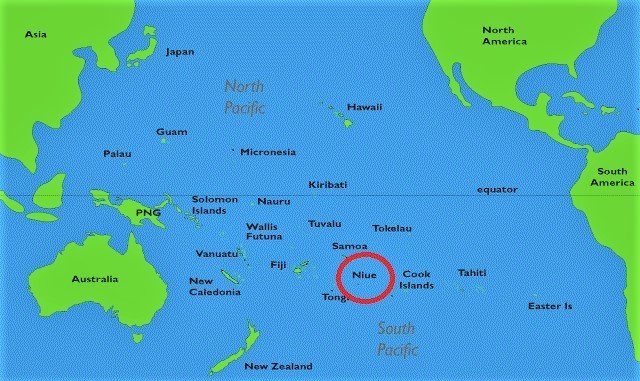Niue Is a 261km Small Sized Island. But In Chinese Thinking It’s As Large As Vietnam
Niue is one of the South Pacific islands included in Chinese Foreign Minister Wang Yi’s mission to deepen relations as part of his Pacific Islands tour. Wang spoke with Niue’s Premier and Foreign Minister Dalton Tagelagi via video on Sunday (May 29), with both sides pledging to deepen bilateral cooperation including on the Belt and Road Initiative.
The country, which lies 2,400km north-east of New Zealand, is a self-governing state in free association with New Zealand, and New Zealand conducts most diplomatic relations on its behalf. As part of the Realm of New Zealand, Niueans are also citizens of New Zealand. Niue, also fondly known as ‘The Rock’ is actually a huge coral atoll, and supports a population of about 1,600. Its principal source of income has been remittances sent back to the island from Niueans living in New Zealand – which is home to about 90% of the Niuean population.
Other than remittances, other sources of income have been foreign aid, mainly from Wellington, although this is being phased out. The island was for some time an offshore financial haven (Dezan Shira & Associates assisted in the 1990’s with the translation of its offshore financial company documentation into Chinese) however this industry collapsed following the Panama Papers scandal. More recently, the island has developed an agriculture industry, the leasing of international telephone lines and internet domains, and some tourism. Niue’s ambitions have been seen in the context of its small, 261km island size.

China however sees Niue rather differently and in ways that highlight the difference between Western and Chinese thinking and development strategies. Niue has the right to an ‘Exclusive Economic Zone’ (EEZ) of Pacific Ocean waters surrounding the island. These extend for 317,500km and are the size of Vietnam. Niue has also announced that it is expanding its ‘protection coverage’ of the EEZ to 100% of the entire area. Its policy in doing so means that Niue alone is responsible for the EEZ management, and in what it can permit.
In April, the Niue Government’s new policy has led to the creation of the Nukutuluea multiple-use marine park. It is split into zones, including the pristine Beveridge Reef, an uninhabited atoll 120 miles from the island where fishing is banned and only scientific studies are allowed; a three-mile zone for traditional canoe fishing, sport fishing and scuba diving; a general ocean zone for foreign commercial fishing; and a conservation zone where vessels can pass through but not stop.
Niue monitors the marine park via satellite surveillance, and as it has no navy, relies on neighbouring Tonga, Samoa, the Cook Islands and New Zealand to carry out annual surveillance operations to look for signs of illegal fishing, which carries heavy punishment.
However, policies can change, with the important step already taken that Niue has exercised its rights to the Pacific Ocean waters lapping up against its shores. China will be looking carefully at Niue and what the island can offer. Influencing whether Niue continues its policy of 100% protection (which actually also includes some commercial fishing) or will seek to persuade it to reduce that and expand permitted fishing rights will be the main point of interest. And this is exactly what happens when Chinese minds see 317,500 kilometers of opportunity, when Western eyes notice just 261.
Related Reading
About Us
Chris Devonshire-Ellis is the Chairman of Dezan Shira & Associates. The firm assists British and Foreign Investment into Asia and has 28 offices throughout China, India, the ASEAN nations and Russia. For strategic and business intelligence concerning China’s Belt & Road Initiative please email silkroad@dezshira.com or visit us at www.dezshira.com





